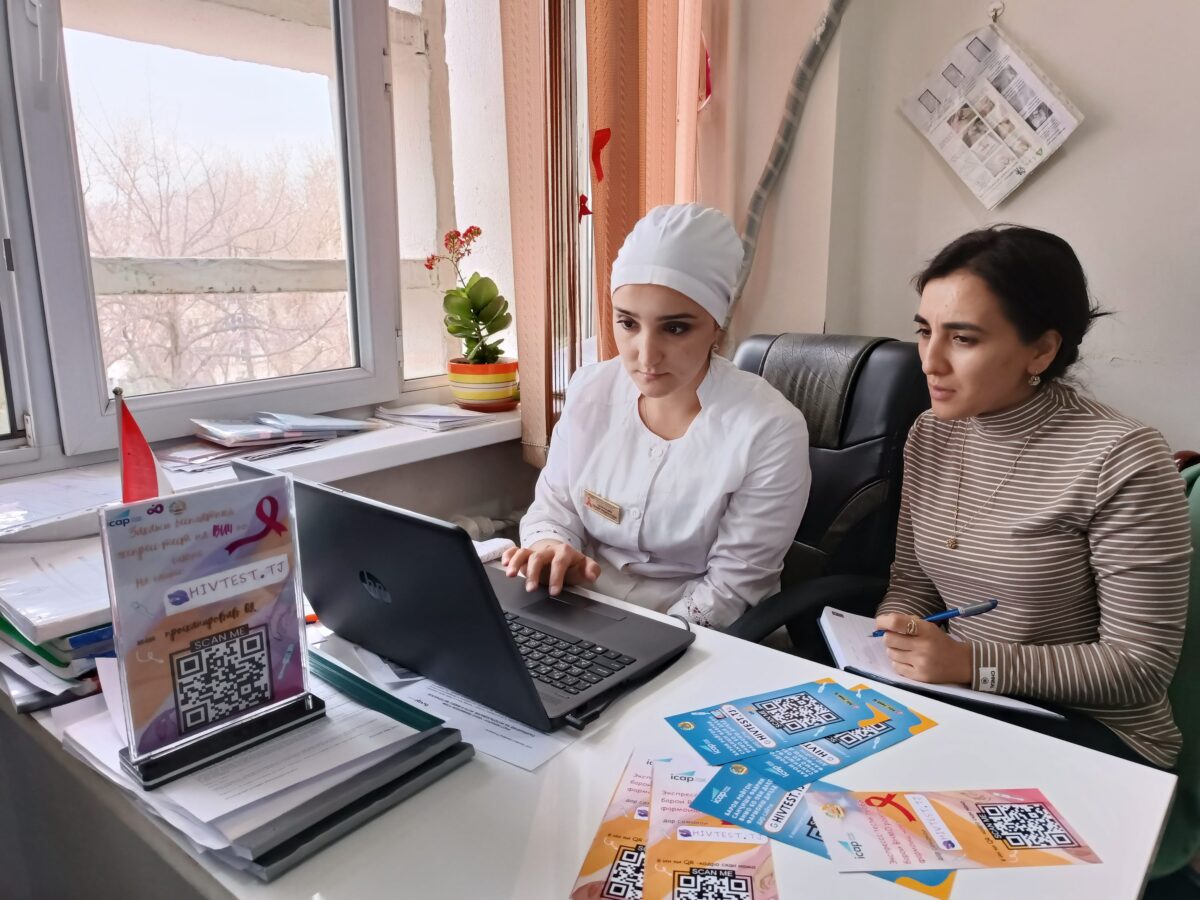In 2023, in the Central Asian country of Tajikistan, more than 650,000 people crossed the border into other countries in search of work and higher incomes. An estimated third to a half of all households in the country have at least one family member working abroad.
Supported by the U.S. President’s Emergency Plan for AIDS Relief (PEPFAR) through the Centers for Disease Control and Prevention (CDC), ICAP in Tajikistan is harnessing innovative approaches to more effectively reach migrant workers and other vulnerable populations with lifesaving HIV services.
Many labor migrants struggle to access medical support when abroad due to lack of required documents and insurance, as well language barriers. In addition, foreign workers are often wary of getting tested for HIV, as an HIV-positive status could lead to deportation in some countries. Given the scale and role of migration in Tajikistan, accessible HIV services are critical to protecting the health of travelling workers and their families.
To promote HIV testing, ICAP developed the website HIVTEST.TJ, where visitors to the site can register for HIV self-test delivery in the city of Dushanbe. Self-testing kits are delivered confidentially to chosen addresses and pick-up points. Through the site, visitors gain access to contacts of local HIV care providers and counsellors, prevention programs for people at high risk of HIV, as well as educational materials on such topics as pre-exposure prophylaxis (PrEP) and early initiation of antiretroviral therapy.
During October 1, 2023, to June 30, 2024 individuals who reported a migration experience within the past three years made up 66 percent (1035 kits) of the 1,560 HIV-self-test orders placed on the website. Of those who ordered self-tests, almost half had not done a test in over a year and 32 percent had never been tested before. Seventy-three percent of those who ordered self-tests were between the ages of 20 and 39.
Due to its success, in 2024, the self-test website was launched in two more cities, Khujand and Ghafurov. In just a few months, 280 self-test kits were delivered in Khujand, the country’s second-most populated city. Two participants tested positive and started anti-retroviral treatment.
“Usually, if someone wants to get an HIV test, they need to go to the closest health center (polyclinic) or the local AIDS Center for a blood test,” says Naimdzhon Malikov, ICAP’s Program Officer in Tajikistan. “And this service offers a more convenient option where a client can get tested on their own using a OraQuick HIV self-test ordered for free through the HIVTEST.TJ website. A very important benefit is that orders made on the website are entirely confidential and do not require clients’ personal data.”
In addition, ICAP, in collaboration with AIDS Centers, has distributed leaflets, flyers, and banners about the HIVTEST.TJ website and additional information for migrants in Khujand’s airport, as well as railway stations, bus stations, and migrant markets in Dushanbe, Khujand, and B.Gafurov.
HIV testing and prevention among sexual partners of returning migrants diagnosed with HIV is also an important priority. At the AIDS Center in the city of Rudaki, ICAP trained staff members on PrEP and counselling for HIV-negative partners of people living with HIV.
Also, with ICAP’s facilitation, Rudaki AIDS Center specialists shared their best practices for working with migrant laborers with health staff at AIDS centers in two other cities. Through monitoring migrants returning home and offering viral load testing to people planning to depart, viral load testing coverage increased by 77 percent and 79 percent in the cities of Gissar and Vahdat by the end of Q3FY24, compared to the end of Q1FY24.
In addition to specialized AIDS centers, ICAP works to improve HIV awareness at primary health care facilities as well, providing medical training and mentoring on HIV services and prevention to a network of 15 city health centers in Dushanbe.
“What is unique about this is that we can start at the primary level through family doctors who work directly with the population,” said Dilshod Saiburkhonov, director of the Dushanbe City AIDS Center. “They know who among them are labor migrants that returned from other countries. They are acquainted with their family members. The impact of this initiative is that we have been able to make every family doctor in the polyclinic more responsible in terms of testing labor migrants for HIV.”
In December 2023, ICAP gathered with the Republican AIDS Center, UNAIDS, International Organization for Migration (IOM), World Health Organization (WHO), the Red Crescent Society of Tajikistan, and “Center for Human Rights” to discuss migrant health and HIV infection, exchanging new findings and formulating joint steps to improve access to HIV services for migrants in the country and abroad.
While promoting HIV services among migrant workers continues to be the focus in Tajikistan, ICAP is also introducing innovative services to serve a number of key populations, including female sex workers, men who have sex with men, and people who inject drugs.
In June 2024, ICAP launched a Social Network Strategy (SNS) in Khujand. The strategy involves incentivizing people from key population groups to refer their peers to get tested for HIV, and, in turn, bring more people from their communities and networks. In Khujand, this strategy is being piloted simultaneously with an electronic system for SNS records. The system simplifies service providers’ work, replacing manual input of data. Based on the pilot’s results, the system may be rolled out in more countries in Central Asia.
“Modern technology allows us to introduce innovative HIV services, making them more accessible and convenient for clients,” concludes Naimdzhon Malikov, Program Officer at ICAP Tajikistan. “This helps us achieve wider HIV testing coverage, provide access to prevention programs for people at high risk of HIV and let people living with HIV start anti-retroviral treatment as early as possible.”
About ICAP
A major global health organization that has been improving public health in countries around the world for two decades, ICAP works to transform the health of populations through innovation, science, and global collaboration. Based at Columbia Mailman School of Public Health, ICAP has projects in more than 40 countries, working side-by-side with ministries of health and local governmental, non-governmental, academic, and community partners to confront some of the world’s greatest health challenges. Through evidence-informed programs, meaningful research, tailored technical assistance, effective training and education programs, and rigorous surveillance to measure and evaluate the impact of public health interventions, ICAP aims to realize a global vision of healthy people, empowered communities, and thriving societies. Online at icap.columbia.edu







